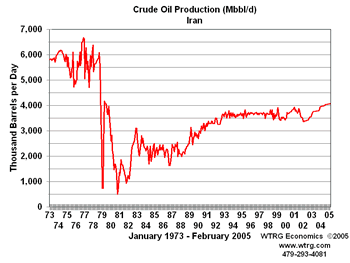There is an interesting analogy to be made here. Opium costs very little to produce yet it has a massive street value once it has been refined to heroin. Just because something is cheap to produce at source does not translate into cheap prices on the street - supply and demand (illegality is a factor here, of course). Oil is cheap to pull out of the ground yet expensive to buy - supply and demand.
I agree that it's an interesting analogy, in part because it's not an exact analogy, and the ways that it isn't say a lot about the economic logic of why and how we're fighting in Afghanistan as opposed to how and why we're fighting in Iraq. The main difference on a commodities level is that if heroin were legal, its value would drop like a box of rocks. And while I'm sure that the PTB would be able to figure out what country to invade to make it artificially scarce if it were, as things stand, they don't. They just have to figure out what country to invade in order to slaughter the competition farther to the east, which might, at least initially, mean lower prices, if that's what's best for business. Either way, whatever sinister forces have finally gotten their hands on Afghanistan's formerly frustratingly out-of-bounds-to-U.S.-interests opium crops, have the luxury of selling low now and high later if they feel like it. And, more to the point, letting the organically predictable amount of post-invasion chaos and havoc continue indefinitely being pretty much the ideal business environment, it's not necessary to keep ramping it up. With Iraqi oil, they're going the opposite route in trade terms -- ie, jacking up the prices so high now so that they will be able to ride to the rescue of a grateful consumer base later by lowering them. Though my guess would be that it won't be to anything close to pre-war prices. Also, it might have been regarded as a drag that in this case slaughtering the competition --ie, the formerly relatively robust Iraqi oil-production sector -- literally entails slaughtering the competition. But if it was, it probably isn't any more, because, you know: Mission accomplished.
But that's just a difference in business models; in both cases, it's still strictly business. Which is my interpretation only, obviously. It's not like I have access to the international drug or oil trade's books and internal memoranda.
But Venezuela has the fourth-largest oil reserves in the world, and no one is bothering them at all!!!
It's not just that the latest round of bothering Venezuela has been quietly escalating since March -- We've been gradually upping the ante in advance of possibly playing the terrorist card (by proxy, through Colombia) against not only
Venezuela, but third-largest-oil-reserve-in-South-America-having
Ecuador, too!
If the
Encycolpedia of the Earth is a reliable source, it sounds like Ecuador is actually going to require more bothering:
Several exceptional factors affect oil production in Ecuador. First, many private companies have clashed with the government over contract and tax issues, especially dealing with rebates of the value-added tax (VAT) paid by oil exporters. Both Occidental Petroleum and EnCana have taken legal action against the Ecuadorian government over VAT rebates. In 2004, an arbitration panel awarded $75 million to Occidental in VAT reimbursements, an award the Ecuadorian government disputes.
Second, there has been significant opposition to oil development by indigenous groups. These groups have repeatedly obstructed exploration and production activities in Ecuador's eastern region. The IIT block, which sits deep in the Amazon region, will likely face particularly fierce resistance from these groups. Indigenous activists have also brought a lawsuit against ChevronTexaco over Texaco's former oil operations in Ecuador. The suit is still in litigation, but a resolution of the case in favor of indigenous activists could introduce additional risk for foreign oil operators.
Protests against the oil industry have had a direct impact upon the country’s crude production. In August 2005, protest groups shut down Petroecuador’s crude oil production for a week, forcing the company to declare force majeure on its crude exports. In February 2006, Petroecuador shut down the SOTE pipeline (see below) for several days, after protesters occupied a pumping stations.
If that's true, then Ecuador's never going to be easy. At least in Venezuela, there's the possibility that if you get rid of Chavez, you can then rely on the failed-coup attempting oil barons of '02 (and, I assume, silently, '04) to deal with the indigenous population, since they have some history of success in that area. But I don't really know enough about Ecuador to know if it's true.


 They've had petrol rationing there for over a year now, i believe. The WSJ figure on
They've had petrol rationing there for over a year now, i believe. The WSJ figure on